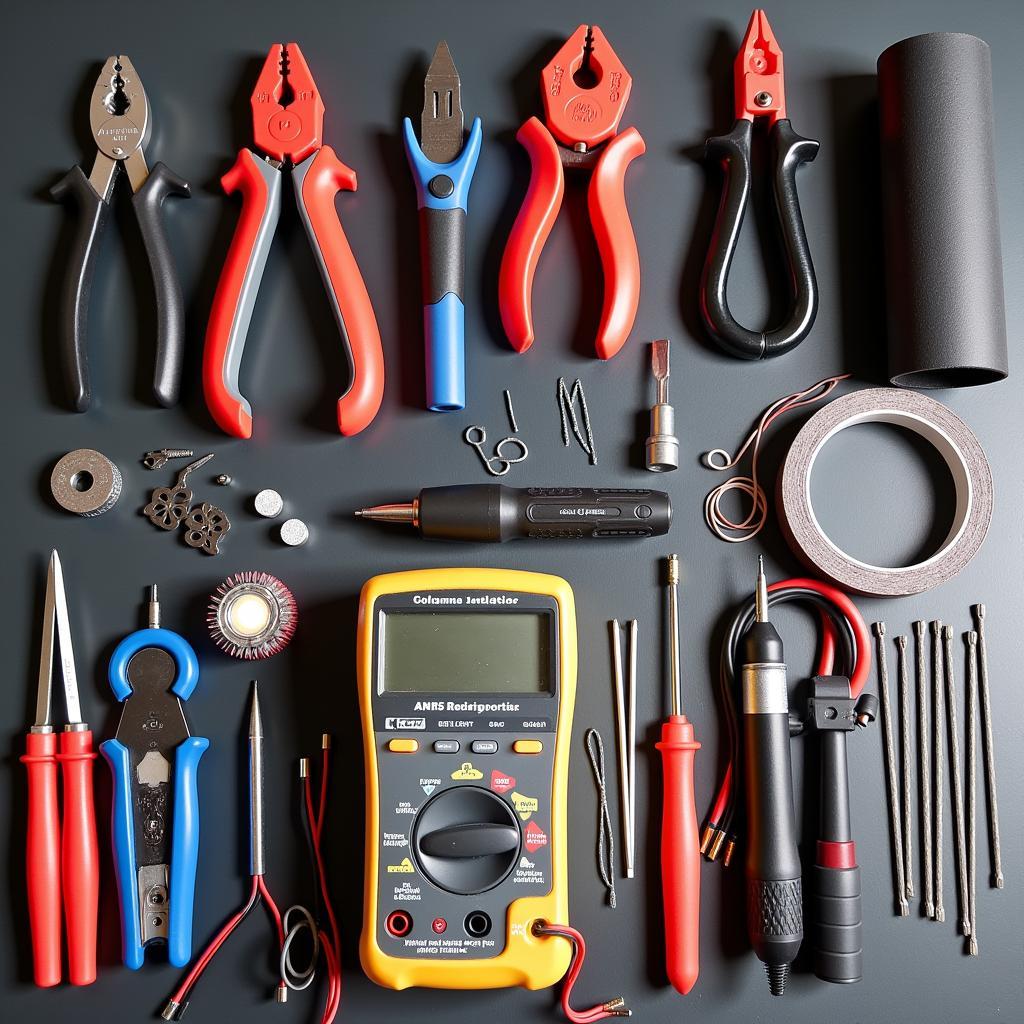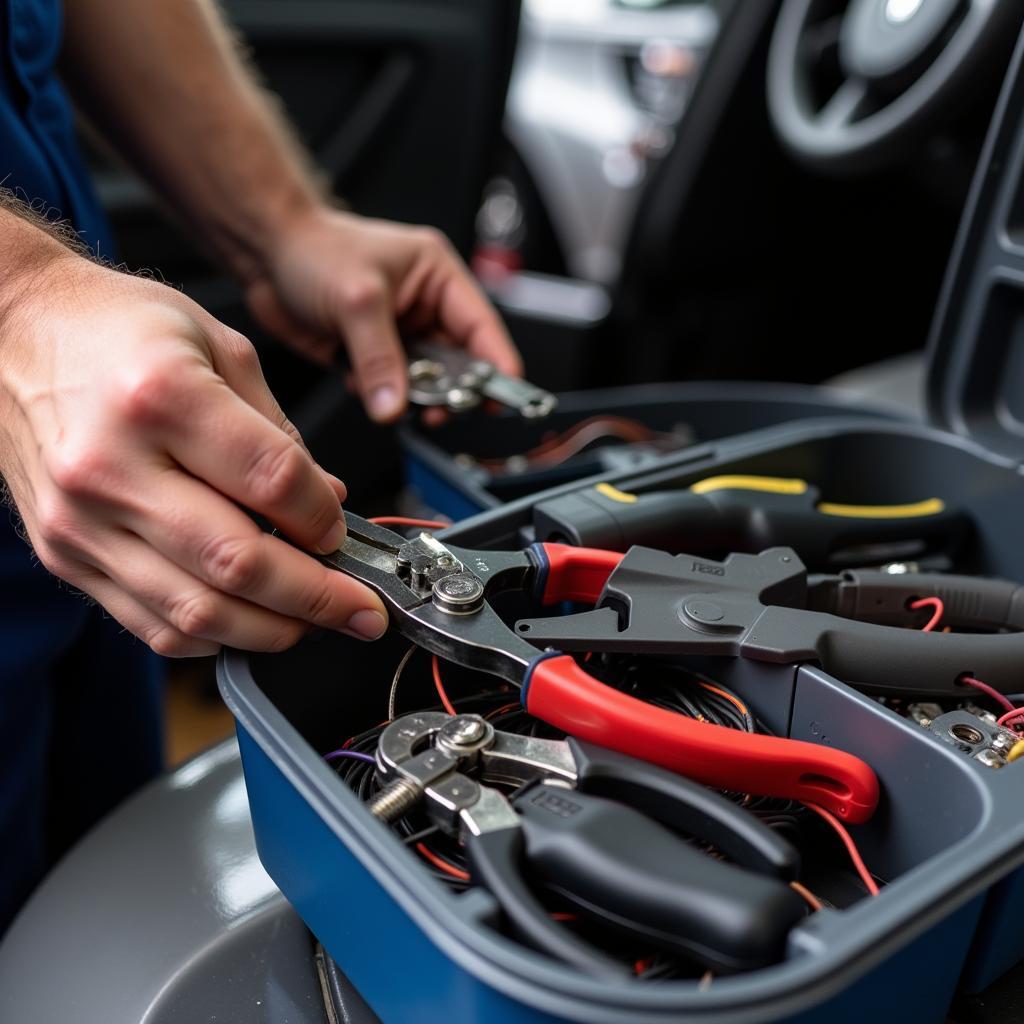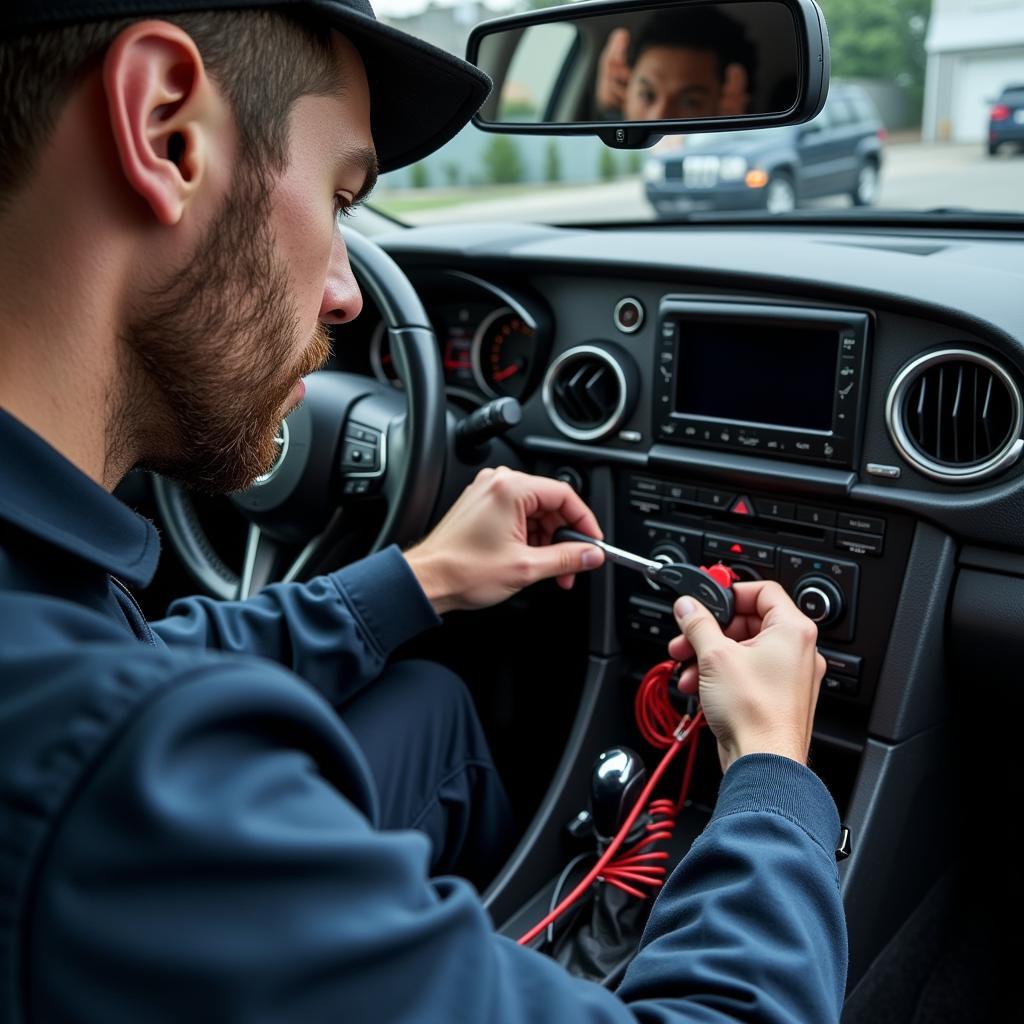Car Alarm Installation Tools are crucial for properly securing your vehicle and deterring theft. Whether you’re a professional installer or a DIY enthusiast, having the right tools makes the process smoother, more efficient, and ensures a reliable installation. This guide will walk you through the essential tools needed for car alarm installation, explaining their functions and offering valuable tips for selecting and using them effectively.
Understanding the Importance of the Right Car Alarm Installation Tools
Choosing the right car alarm installation tools can be the difference between a seamless installation and a frustrating experience. Using improper tools can damage your vehicle’s wiring, compromise the alarm system’s functionality, or even create safety hazards. For a professional-looking and reliable installation, investing in quality tools is essential.
One key aspect is choosing tools that are compatible with your vehicle’s electrical system. Using the wrong type of wire stripper, for example, could damage delicate wires and lead to malfunctions. Similarly, using low-quality connectors can result in poor connections, compromising the alarm’s reliability. Having the correct car diagnostics plug lock can also deter theft through the diagnostic port.
Essential Tools for Car Alarm Installation
Here’s a breakdown of the must-have car alarm installation tools:
- Wire Strippers: Essential for removing the insulation from wires without damaging the conductor. Opt for a high-quality stripper with adjustable gauges to accommodate different wire sizes.
- Crimping Tool: Used to create secure connections between wires and terminals. A good crimping tool will provide consistent, reliable crimps, ensuring proper electrical contact.
- Soldering Iron and Solder: While not always mandatory, soldering provides the most robust and reliable electrical connections. This is particularly important for connections that may be exposed to vibration or moisture.
- Multimeter: This versatile tool helps you test circuits, check voltage, and diagnose potential wiring problems. It’s indispensable for troubleshooting any issues during or after installation.
- Test Light: A simpler alternative to a multimeter, a test light can quickly identify live wires and check for continuity in circuits.
- Panel Removal Tools: These specialized tools help you safely remove interior panels and trim without causing damage. They come in various shapes and sizes to fit different clips and fasteners.
- Drill and Drill Bits: You’ll need a drill for mounting the alarm components, such as the siren and sensors. Choose a drill with variable speed control for precise drilling.
- Zip Ties and Electrical Tape: These are essential for organizing and securing wires, keeping your installation neat and professional.
- Wire Connectors: Various types of connectors, such as butt connectors, spade connectors, and ring terminals, are necessary for making secure and reliable connections.
 Essential Car Alarm Installation Tools Kit
Essential Car Alarm Installation Tools Kit
Beyond these essential tools, consider specialized tools like a circuit tester, which can be extremely helpful in diagnosing complex wiring problems. For those seeking added security, explore options like diagnostic port lock for car.
What tools are needed for installing a car alarm?
The basic tools needed for car alarm installation include wire strippers, a crimping tool, a multimeter, panel removal tools, a drill, and zip ties.
How to choose the right car alarm installation tools?
Select tools that are durable, well-made, and appropriate for your vehicle’s electrical system. Research reputable brands and consider investing in a comprehensive tool kit.
 Mechanic Selecting Car Alarm Installation Tools
Mechanic Selecting Car Alarm Installation Tools
Tips for Effective Car Alarm Installation
- Read the Instructions: Before starting, carefully review the alarm system’s installation manual. Different systems have specific wiring requirements.
- Plan Your Wiring: Before cutting any wires, plan the routing and placement of the alarm components and wiring harnesses.
- Disconnect the Battery: Always disconnect the negative battery terminal before working on your vehicle’s electrical system.
- Test Your Connections: Use a multimeter or test light to ensure all connections are secure and functioning properly before reconnecting the battery.
- Secure Wiring: Use zip ties to secure the wiring harnesses and prevent them from rattling or becoming damaged.
- Consider Professional Installation: If you’re unsure about any aspect of the installation, it’s always best to consult a qualified car alarm installer. Protecting your vehicle with anti car theft tools is a wise investment.
Advanced Car Alarm Installation Techniques
For those comfortable with basic installations, exploring advanced techniques can enhance security further. This includes integrating the alarm with other vehicle systems, such as the central locking and remote start features.
“Integrating your car alarm with other vehicle systems provides a more seamless and convenient user experience,” says John Stevenson, a certified automotive electronics technician with over 20 years of experience. “It also enhances security by providing multiple layers of protection.”
 Technician Installing Car Alarm with Advanced Techniques
Technician Installing Car Alarm with Advanced Techniques
Conclusion
Investing in the right car alarm installation tools is crucial for a successful and reliable installation. By choosing quality tools, understanding their functions, and following proper installation techniques, you can effectively protect your vehicle from theft and enjoy peace of mind. Remember that proper installation is just as important as the alarm system itself. Consider exploring 8p car diagnostics for more information about your car’s systems.
FAQ
- What is the most important tool for car alarm installation? A high-quality wire stripper is arguably the most important tool.
- Can I install a car alarm myself? Yes, but it requires some technical knowledge and the right tools.
- What should I do if I encounter problems during installation? Consult the alarm system’s manual or contact a professional installer.
- How can I test my car alarm after installation? Test all the alarm functions, including the siren, sensors, and remote control.
- What type of wire connectors should I use? Use connectors that are compatible with the gauge of the wires you are connecting.
- How often should I check my car alarm system? It’s recommended to check your car alarm system at least once a year.
- What can I do to further enhance the security of my car alarm? Consider adding additional sensors or integrating the alarm with other security systems.
For assistance with your car diagnostic needs, contact us via WhatsApp: +1(641)206-8880, Email: [email protected] or visit us at 910 Cedar Lane, Chicago, IL 60605, USA. Our customer service team is available 24/7.

Leave a Reply